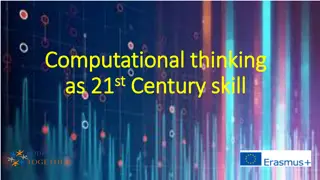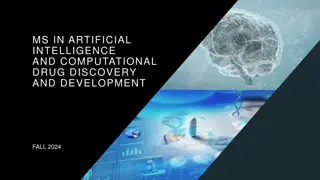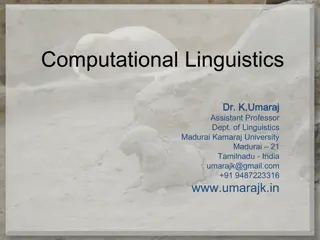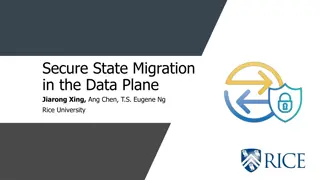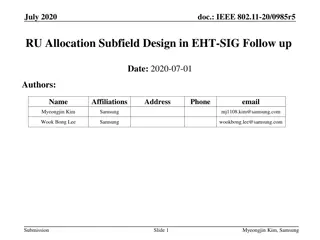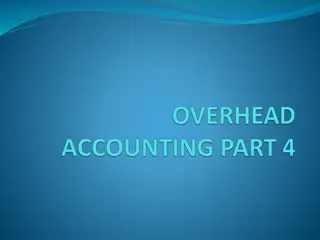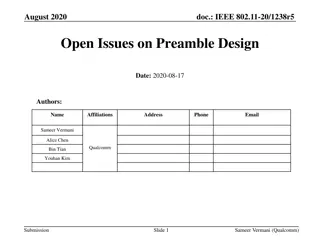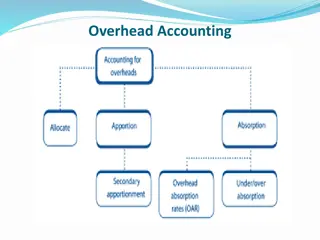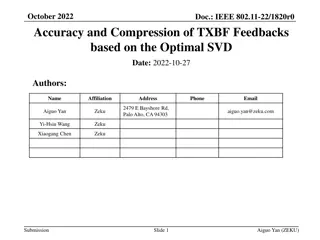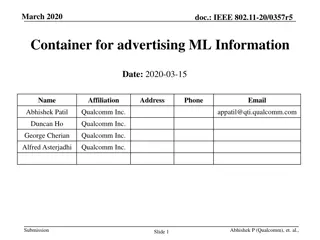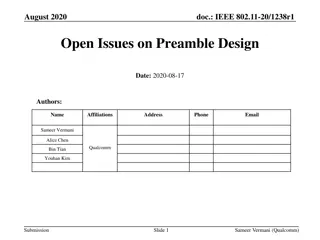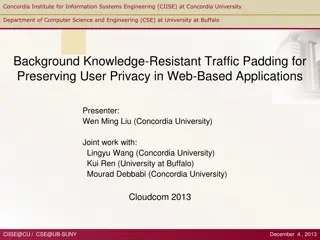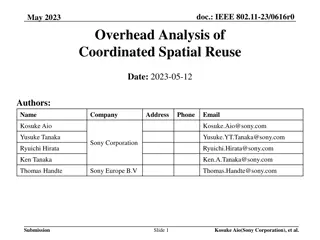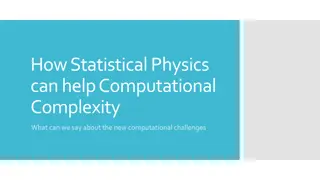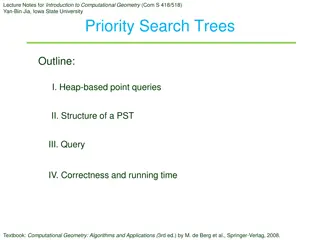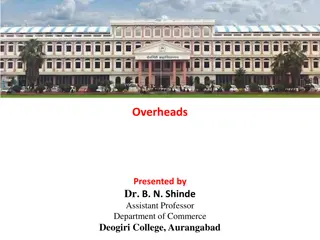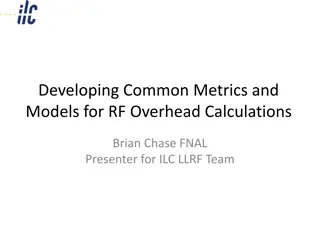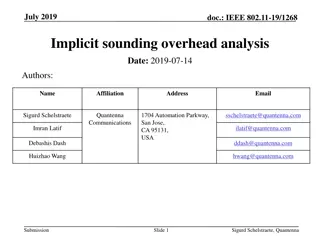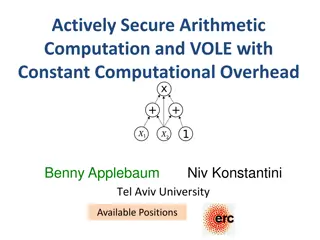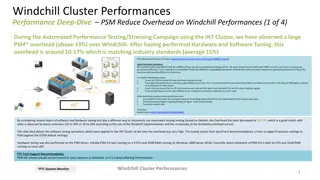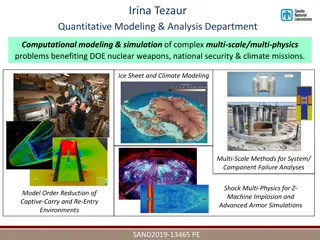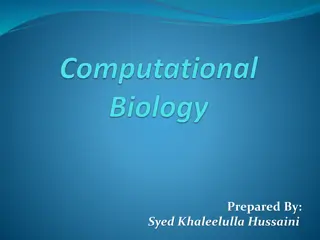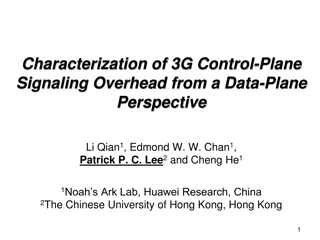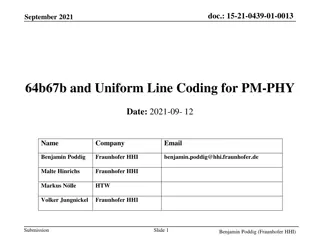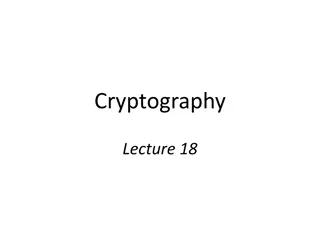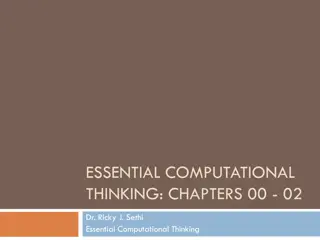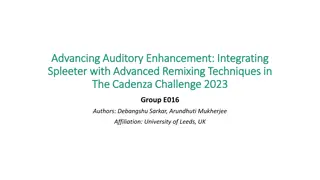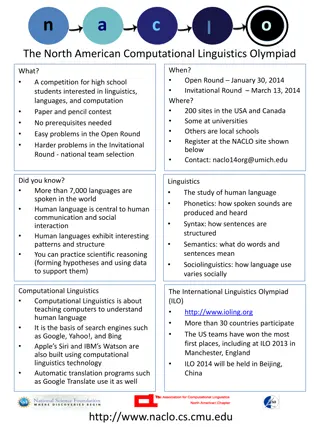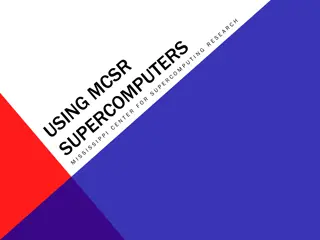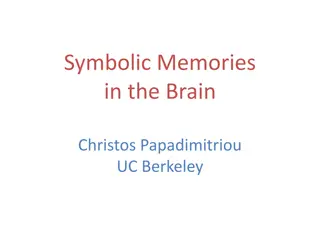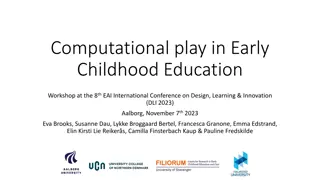Computational thinking as 21st Century skill
Computational thinking is a critical skill for the digital age, involving problem-solving techniques that enable computers to process information effectively. It precedes programming and requires breaking down complex problems into manageable steps. Educators emphasize computational thinking exercis
7 views • 4 slides
Master's Program in Computational Drug Discovery and Development - Fall 2024 Curriculum
This Master's program offers a comprehensive curriculum focusing on Artificial Intelligence, Computational Drug Discovery, and Development. With a blend of cutting-edge technologies and practical applications, students delve into techniques, AI/ML, big data mining, modeling, and more. Through intens
1 views • 7 slides
Understanding Computational Linguistics and Natural Language Processing
Explore the fascinating fields of Computational Linguistics and Natural Language Processing (NLP), delving into their development, applications, and significance. Learn about the study of human languages in computational models, the importance of corpora in linguistic research, and the various types
1 views • 33 slides
Secure State Migration in the Data Plane Overview
The data plane synchronization protocol for secure state migration addresses the challenges of untrusted networks, ensuring completeness, low overhead, and integrity guarantee. P4Sync offers a solution by running in the data plane with minimal local control plane involvement, ensuring completeness,
2 views • 21 slides
CIGRE Canada Study Committees Update Meeting 2021: Advancing Overhead Lines Technology
Study Committee B2 focuses on improving overhead lines technology, ensuring reliability, and environmental compatibility. The Canadian representative, Pierre Van Dyke, plays a key role in Technical Direction and various advisory groups. Working groups within SC B2 address diverse topics such as dyna
0 views • 12 slides
IEEE 802.11-20/0985r5 RU Allocation Subfield Design in EHT-SIG
The document discusses the design of subfields in EHT-SIG for RU allocation in IEEE 802.11be, focusing on reducing overhead by considering supported large-size MRU combinations. It addresses concerns on entries overhead in the RU allocation subfield table and the clarity of support for specific MRU
3 views • 24 slides
Computation of Machine Hour Rate: Understanding MHR and Overhead Rates
Computation of Machine Hour Rate (MHR) involves determining the overhead cost of running a machine for one hour. The process includes dividing overheads into fixed and variable categories, calculating fixed overhead hourly rates, computing variable overhead rates, and summing up both for the final M
4 views • 18 slides
IEEE 802.11-20/1238r5 August 2020 Preamble Design Open Issues
In these slides, designs for U-SIG content & overflow and EHT-SIG design are proposed. The focus is on punctured channel indication design with the aim of conveying puncturing patterns efficiently while keeping signaling overhead low. The proposal includes a 6-bit field for puncturing information, a
1 views • 41 slides
Understanding Overhead Accounting and Allocation Process
Overhead accounting involves allocating and apportioning overhead costs to different departments or cost centers in a company. This process includes dividing cost centers into production and service departments, assigning overhead costs accurately, and distributing common overhead costs proportionat
0 views • 18 slides
Understanding Absorption Costing and Overhead Absorption in Cost Accounting
Absorption costing is a method that includes direct costs and a fair share of production overhead costs in the cost of a product. Overhead absorption rate (OAR) is calculated using budgeted figures and can lead to over/under-absorption. Over-absorption occurs when absorbed overhead is more than actu
1 views • 23 slides
Reduction of Feedback Overhead in IEEE 802.11be
Discussion on reducing channel acquisition overhead to support 16 Spatial Stream MIMO and Multi-AP coordination in IEEE 802.11be. Methods include limiting feedback information, using implicit feedback in reciprocal systems, and improving explicit and implicit feedback schemes.
0 views • 14 slides
IEEE 802.11-22/1820r0: Accuracy and Compression of TXBF Feedbacks
This document discusses the accuracy and compression of Transmit Beamforming (TXBF) feedbacks based on Optimal Singular Value Decomposition (SVD). It covers the background, optimal SVD-based TXBF feedback (Decimation), simulation results, and proposals for overhead reduction schemes in the context o
4 views • 17 slides
Efficient Information Exchange for Wireless Networks
This document discusses the optimization of information exchange in IEEE 802.11 networks to reduce management frame overhead, improve power efficiency, and streamline the process of gathering and exchanging MLO information between APs and non-AP MLDs. The proposal suggests using beacon frames and di
3 views • 30 slides
IEEE 802.11-20/1238r1 Preamble Design Open Issues
Proposed designs addressing preamble design issues in IEEE 802.11-20/1238r1 include U-SIG content and overflow for Unified SU/MU PPDU, EHT-SIG design, and punctured channel indication. The focus is on conveying puncturing patterns efficiently while minimizing signaling overhead. The design features
5 views • 32 slides
Protecting User Privacy in Web-Based Applications through Traffic Padding
Explore a novel approach utilizing knowledge-resistant traffic padding to safeguard user privacy in web-based applications. The study addresses side-channel attacks on encrypted traffic, the challenges of maintaining security in untrusted internet environments, and the potential privacy overhead of
0 views • 31 slides
Overhead Analysis of Coordinated Spatial Reuse in IEEE 802.11-23
Analysis of overhead components impacting the performance of Coordinated Spatial Reuse (Co-SR) in IEEE 802.11-23 standard for wireless communication. Evaluation of MAC overhead, negotiation and measurement phases, and frames in the negotiation phase. Discussion on the impact of overhead on Co-SR per
0 views • 14 slides
Understanding Computational Complexity Through Statistical Physics
In the age of vast data growth, tackling complex computational problems is crucial. Statistical physics can provide insights into handling the new challenges arising from the exponential increase in data. As we delve into understanding the complexity of computational tasks, it becomes evident that e
0 views • 24 slides
Introduction to Priority Search Trees in Computational Geometry
This lecture outlines the structure and query process of Priority Search Trees (PST) in computational geometry. It covers heap-based point queries, range trees for windowing queries, handling query ranges in 1D and 2D spaces, and using heaps to efficiently handle query ranges. The content discusses
1 views • 18 slides
Understanding Overhead Costs and Their Importance in Business
Overhead costs play a crucial role in cost allocation and management within an organization. These costs, which include indirect expenses such as labor, materials, and services, cannot be directly linked to specific units of production. Instead, overhead costs are apportioned and absorbed using vari
0 views • 16 slides
Understanding Overhead Costs in Accounting
Overhead costs are supplementary expenses that cannot be easily allocated to specific cost objects. This includes indirect materials, labor, and expenses. Accounting and control of overheads involve steps like classification, codification, collection, allocation, apportionment, absorption, under/ove
1 views • 17 slides
Understanding Overhead Allocation in Financial Accounting
Overhead in accounting refers to expenses incurred in production or providing services that cannot be directly traced to specific products or departments. This involves classifying overhead based on function, element, and behavior, as well as allocating, apportioning, and absorbing overhead costs in
0 views • 13 slides
Understanding Overhead Costs in Accounting
Overheads in accounting consist of indirect materials, labor, and expenses not directly attributable to a specific cost object. They play a vital role in budgeting and pricing strategies for businesses. Overheads can be classified based on elements and functions, such as factory overhead, office and
0 views • 23 slides
Overview of Administrative Services Overhead Charge (ASO)
The Administrative Services Overhead Charge (ASO) allows central administration to recover costs for support services by allocating them to separately funded areas of the campus. Various costs are charged through ASO, with a focus on administrative, environmental health, personnel, and other service
0 views • 11 slides
Developing Common Metrics and Models for RF Overhead Calculations
Issues surrounding power overhead in RF engineering, optimizing design power budget, understanding losses and disturbances, simulations, meaningful measurements, and future plans for the ILC. Topics covered include power requirements, cost optimization, accelerator section costs, static losses, and
5 views • 15 slides
Implicit Sounding Analysis in IEEE 802.11: Overhead Reduction
The document discusses implicit sounding as an efficient alternative to traditional sounding protocols in IEEE 802.11 standards. Implicit sounding aims to minimize the airtime overhead by requesting information from Beamformee to estimate channels, potentially reducing explicit feedback requirements
3 views • 20 slides
Actively Secure Arithmetic Computation and VOLE Study
Exploring actively secure arithmetic computation and VOLE with constant computational overhead at Tel Aviv University. Understanding how functions are represented in secure computation using arithmetic circuits over boolean circuits. Efficiently evaluating arithmetic circuits over large finite field
0 views • 36 slides
Windchill Cluster Performance Deep-Dive: PSM Overhead Reduction Strategies
During an automated performance testing campaign, a large PSM overhead was observed over Windchill, which was reduced to around 10-17% through hardware and software tuning efforts. Various recommendations and strategies were shared, including turning off UEM if not required, avoiding monitoring remo
0 views • 4 slides
Advancing Computational Modeling for National Security and Climate Missions
Irina Tezaur leads the Quantitative Modeling & Analysis Department, focusing on computational modeling and simulation of complex multi-scale, multi-physics problems. Her work benefits DOE nuclear weapons, national security, and climate missions. By employing innovative techniques like model order re
0 views • 6 slides
Understanding Computational Biology: Proteins, DNA, RNA, Genetics, and Evolution
Computational Biology combines computational methods with molecular biology to solve biological problems. Explore topics like proteins, DNA, RNA, and genetics, learning about amino acids, nucleotides, and the genetic code. Understand the evolutionary processes of mutation and natural selection.
0 views • 21 slides
Understanding Overhead Labour Costs in Neo-Kaleckian Growth Models
Overhead labour costs play a crucial role in income distribution and determining whether economies operate in a profit-led or wage-led demand regime. This article explores the relationship between overhead labour, non-supervisory workers, and managers in the context of economic models proposed by re
0 views • 39 slides
Characterization of 3G Control-Plane Signaling Overhead
This study focuses on characterizing the control-plane signaling overhead in 3G networks caused by the initiation and release of radio resources with raw IP data packets. It explores the impact of massive signaling messages triggered by data transfer on 3G networks, aiming to validate a data-plane a
0 views • 22 slides
Optimizing Line Coding for PM-PHY: A Detailed Analysis
Enabling line coding and channel equalization methods for PM-PHY, the IEEE 802.15.13 standard introduces overhead while enhancing channel adaptation. This contribution proposes 64b67b and Uniform Line Coding as alternative transmission modes, aiming to reduce line coding overhead while maintaining a
0 views • 26 slides
Introduction to Computational Number Theory in Cryptography
Practical private-key cryptography can be done without advanced math, but understanding computational number theory is essential for public-key encryption. This field focuses on the computational difficulty of problems, analyzing algorithms' running times, classifying problems as easy or hard based
0 views • 27 slides
Understanding the Essence of Computer Science and Computational Thinking
Delve into the fundamentals of Computer Science and Computational Thinking through chapters discussing the nature of science, predictions in physics, and the distinction between Computer Science and Computer Information Systems. Explore the relationships between Math, Physics, and Computer Science i
0 views • 29 slides
Advancing Auditory Enhancement: Integrating Spleeter with Advanced Remixing Techniques in The Cadenza Challenge 2023
Our project for The Cadenza Challenge 2023 focused on improving audio for headphone users with hearing loss by integrating Spleeter's deep learning capabilities. We utilized N-ALR prescriptions, Butterworth bandpass filters, and Dynamic Range Compression to enhance audio quality. By leveraging advan
0 views • 19 slides
North American Computational Linguistics Olympiad: A Competition for High School Students
The North American Computational Linguistics Olympiad (NACLO) is a competition for high school students interested in linguistics, languages, and computation. It consists of an Open Round in January and an Invitational Round in March, with no prerequisites needed. Participants tackle easy problems i
0 views • 4 slides
Mississippi Center for Supercomputing Research (MCSR) Overview
The Mississippi Center for Supercomputing Research (MCSR) supports computational research in various fields like Chemistry, Bioinformatics, Physics, Engineering, and Computer Science for Mississippi IHLs. They provide training to optimize computational resources, offer classes for computational trai
0 views • 23 slides
Exploring Computational Theories of Brain Function
In this series of images and text snippets, the discussion revolves around the emerging field of computational theories of brain function. Various aspects such as symbolic memories, the relationship between the brain and computation, the emergence of the mind from the brain, and computational thinki
0 views • 53 slides
Computational Earth Science Course Overview
Explore the world of Computational Earth Science with Bill Menke as the instructor and Emily Glazer as the teaching assistant. The course aims to help you become proficient in applying Python-based computational methods to understand dynamic Earth Science phenomena. Through modeling, you will gain i
0 views • 34 slides
Exploring Computational Play in Early Childhood Education: DLI 2023 Workshop
The workshop at the 8th EAI International Conference on Design, Learning & Innovation (DLI 2023) in Aalborg aims to delve into the application of computational play with mathematics in early childhood education. Through live sessions and discussions, opportunities and challenges in utilizing computa
0 views • 7 slides
